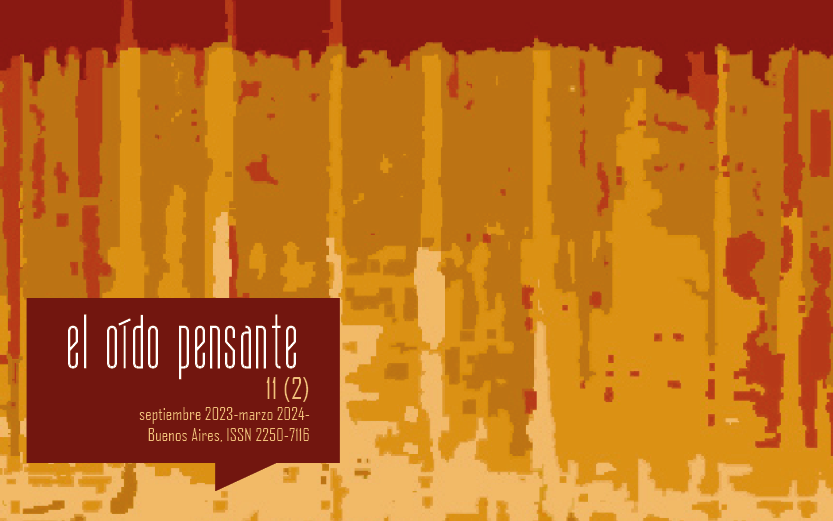Tefla Madlouma. Female Resilience and Saharawi Cultural Memory through the Production of an Ethnographically Grounded Music Video
Abstract
Tefla Madlouma is a song by one of the greatest Saharawi artists, Mariem Hassan. In this song she relates the abuse suffered by a young girl, transforming an individual violence into a metaphor of the conflict ongoing since the Seventies in Western Sahara between Frente Polisario and the Moroccan Army. Tefla Madlouma is considered especially significant for Saharawi women, and it has been chosen by a group of activists of the collaborative ethnography project Sahara Soundscapes for producing a music video. The group included Saharawi and non-Saharawi activists, ethnographers and communication professionals. Beyond its possible contribution to Saharawi struggle, the collaborative and creative process of video-making has been an opportunity to reflect together on women’s role in Saharawi society and culture. In this paper we describe this process, from the recording of a cover of the original song to the final cut, reflecting also on the use, in the collaborative ethnography of musical practices, of “ethnographically grounded music videos”.Downloads
References
Álvarez Veinguer, A. (2022). Aprender a escuchar, más allá de la palabra. Experimentaciones a partir de la etnografía colaborativa. Aposta, 92, 8-24.
Bates, E. (2012). Social Life of Musical Instruments. Ethnomusicology, 56(3), 363-395.
Dietz, G., y Álvarez Veinguer, A. (2015). Doubly Reflexive Ethnography for Collaborative Research in the Anthropology of Education. En P. Smeyers et al. (Eds.) International Handbook of Interpretation in Educational Research (pp. 653-675). Berlín: Springer.
Duarte, A. J. (2015). A paisagem cantada como repositório de memória e potenciadora de novas paisagens: o caso da música raiz no Sul de Minas. El oído pensante, 3(1), 1-21.
Frith, S. (2001). Hacia una estética de la música popular. En F. Cruces (Ed.). Las culturas musicales. Lecturas en etnomusicología (pp. 413-435). Madrid: Trotta.
Frith, S., Goodwin, A., y Grossberg, L. (Eds.). (1993). Sound and Vision: The Music Video Reader. London: Routledge.
García, M. A. (2020). Todo es archivo en la web. Reflexiones en torno a la búsqueda y descarga de música. Cuadernos de Documentación Multimedia, 31.
Giménez Amorós, L. (2013a). Comercialización de la música saharaui en el mundo occidental a través de Nubenegra (Madrid, 1998-2011). Resonancias, 33, 147-166.
Giménez Amorós, L. (2013b). Desert blues: la guitarra en la música saharaui. A Contratiempo: revista de música en la cultura, 22(4).
Giménez Amorós, L. (2015). Azawan: Precolonial Musical Culture and Saharawi Nationalism in the Refugee Camps of the Hamada Desert in Algeria. African Music: Journal of the International Library of African Music, 10(1), 31-51.
Giménez Amorós, L. (2020). Beyond Nationhood: Haul Music from a postcolonial perspective in Western Sahara and Mauritania. African Music, 11(2).
Goldberg, M. K. (2022). Sonidos negros: sobre la negritud del flamenco (Vol. 11). Granada: Libargo editorial.
Haidar, L. (2007). Cuentos saharauis. Traducción y aproximación a los cuentos de animales. Madrid: Ediciones Idea.
Haidar, L. (2013). Tres amores árabes, aproximación al amor en Al-Ándalus, Marruecos y el Sáhara Occidental. Madrid: Ediciones Idea.
Hannula, M., Suoranta, J. y Vaden, T. (2014). Artistic Research: Theories, Methods and Practices. Gothenburg: University of Gothenburg.
Hassan, M. (2010). Shouka (Álbum). Nubenegra.
Holmes, D. R. y Marcus, G. E. (2008). Collaboration Today and the Re-Imagination of the Classic Scene of Fieldwork Encounter. Collaborative Anthropologies, 1, 81-101.
Infante, B. (2010 [1929-33]). Orígenes de lo flamenco y secreto del cante jondo. Sevilla: Junta de Andalucía.
Illescas, J. E. (2015). La Dictadura del Videoclip. Industria musical y sueños prefabricados. Barcelona: El Viejo Topo.
Israel, N. (2000). Outlandish. Writing Between Exile and Diaspora. California: Stanford University Press.
Jirsa, T. y Korsgaard, M. B. (2019). The Music Video in Transformation: Notes on a Hybrid Audiovisual Configuration. Music, Sound and the Moving Image, 13(2), 111-122.
Korsgaard, M. (2019). Music Video After MTV. Audiovisual Studies, New Media, and Popular Music. London: Routledge.
Lassiter, L. E. (2005). The Chicago Guide to Collaborative Ethnography. Chicago: University of Chicago Press.
Machin-Autenrieth, M. (2020). The Musical Bridge. Intercultural Regionalism and the Immigration Challenge in Contemporary Andalusia. Genealogy, 4(5), 1-19.
Manuel, A. (2010). La huella morisca. Córdoba: Almúzara.
Manuel, A. (2018). Flamenco: Arqueología de lo jondo. Córdoba: Almúzara.
Mercer, J. (1976). Spanish Sahara. London: Allen and Unwin.
Miguel, A.F., Ranocchiari, D. y Sardo, S. (2020). Prácticas de investigación compartida en música. Tentativas y desafíos desde Portugal. AIBR Revista de Antropología Iberoamericana, 15(2), 357-382.
Mourão, R. (2014). Ensaio de artivismo. Vídeo e performance. Lisboa: Imprensa Nacional Casa da Moeda.
Oliveira, A., Baba, J., A.S.O.M., Contreras Rodríguez, E., Domínguez, M., y Pérez Rivera, L. (2016). Haul, música saharaui. Madrid: Turpin Editores.
RAE. (2020). Informe de la Real Academia Española sobre el lenguaje inclusivo y cuestiones conexas. Madrid: Real Academia Española.
Raposo, P. (2015). “Artivismo”: articulando dissidências, criando insurgências. Cadernos de Arte e Antropologia, 4(2), 3-12.
Rappaport, J. (2008). Beyond Participant Observation: Collaborative Ethnography as Theoretical Innovation. Collaborative Anthropologies, 1(1), 1-31.
Romero Luque, J.M. (2023). Sahara soundscapes. Tras las sendas del tebal. Entre la etnografía compartida, las prácticas artivistas femeninas y el archivo digital. Granada: Universidad de Granada. Recuperado de: https://hdl.handle.net/10481/83395
Rouch, J. (Dir.). (1958). Moi, un noir. Films de la Pléiade.
Rouch, J. (Dir.). (1967). Jaguar. Films de la Pléiade.
Rouch, J. (2003). Ciné-Ethnography (S. Feld, Ed.). Minneapolis: University of Minnesota Press.
Sardo, S. (2017). Shared Research Practices on and about Music: Toward Decolonizing Colonial Ethnomusicology. En J. Martí y S. Revilla Gútiez (Eds.). Making Music, Making Society. Cambridge: Cambridge Scholars.
Van Breda, A. (2018). A Critical Review of Resilience Theory and its Relevance for Social Work. Social Work, 54(1)1, 1-18.
Vara, A. S. (2020). Habita donde pisas: Una aproximación hacia el habitar vernáculo en las cuevas de Granada. Antropología Experimental, (20), 53-72.
Vilela, I. (2017). Caipira: cultura, resistência e enraizamento. Estudos Avançados, 31(4), 267-282.























